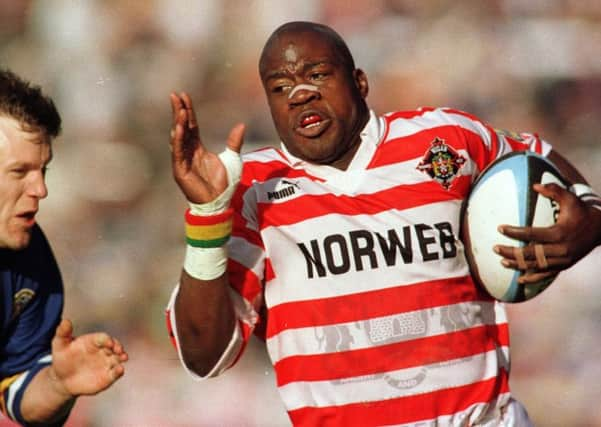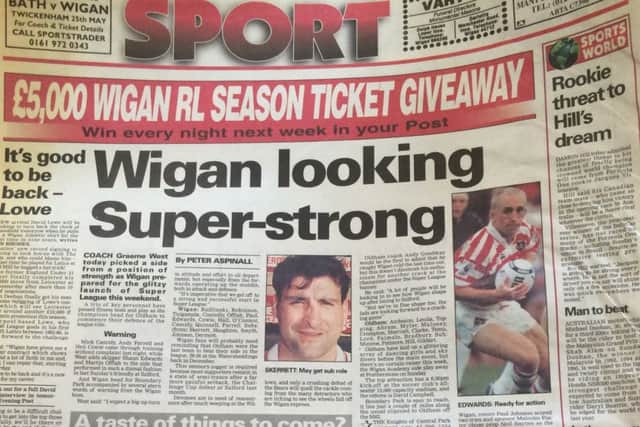Steps into the unknown: 20 years since Wigan's Super League debut


As champions from the last winter season, and for the seventh time in a row, perhaps Wigan fans were expecting more of the same as the first summer season was ushered in.
Based on their opening game at Oldham, 20 years ago tonight, little looked to have changed on the rugby league landscape on this side of the English Channel.
Advertisement
Hide AdAdvertisement
Hide AdParis St Germain had punters expecting the French club to pack some muscle after they had beaten Sheffield Eagles the previous night but, at Boundary Park, Wigan cruised to a 56-16 win to assert their tag as title favourites.


And watching back the images as Martin Offiah touched down for Wigan’s first Super League try – 34 minutes into the match – it’s amazing to see how much nostalgia comes flooding with the video.
We all know Wigan’s dominance came to an end, with St Helens taking that first title, and the now-Warriors have since claimed three of the 20 titles up for grabs – small change compared to their seven in a row in the 90s.
But apart from teams adding names, moving stadiums and the comings and goings of a few clubs, RFL CEO Nigel Wood thinks more has changed than is evident at first glance.
Advertisement
Hide AdAdvertisement
Hide Ad“The bigger test is where rugby league is played,” he said. “It’s played in more places than it ever has been.


“It might not be at Super League level but the fixture list this weekend will include semi-professional teams from Hemel, Oxford, Coventry, Gloucester and Newcastle to name but a few – places that wouldn’t have appeared on the map in 1996.
And despite the fact only Wigan, Leeds, St Helens and Bradford have claimed titles over the past two decades, Wood thinks the structure in place in today’s game is a good marriage to geographical expansion with teams such as Catalans, Oxford and University of Gloucester All Golds jostling for position in their respective leagues.
“I think we’ve got a deeper, broader and richer playing constituency than we’ve ever had,” he said.
Advertisement
Hide AdAdvertisement
Hide Ad“They might not all appear at the top table but in some ways that doesn’t matter. If a club deserves its place at the top table, we have a structure now that allows it to get there.”
But aside from gripes fans have with Super League-era introductions such as the video referee and the salary cap, reporters have pointed out there is still work to be done.
One respected columnist argued: “The league can’t afford to be complacent.
“It is operating in a sporting landscape with more competition for airtime, column inches, web hits and ticket sales than before – how big were darts and UFC 20 years ago? – and it needs to continue to push the boundaries, think outside the box, be original.”
Advertisement
Hide AdAdvertisement
Hide AdAs far as expansion in the professional ranks is concerned, Wood has confirmed that talks are ongoing with a Canadian consortium who want to enter a Toronto-based team in League 1 in 2017 alongside Toulouse, who also have ambitions to get into Super League after re-entering the British competition at the third-tier level this year.
“The world has shrunk over the last 20 years,” Wood said. “It is interesting that in the southern hemisphere competition, there is now a team playing from Papua New Guinea and I understand a team will be admitted from Fiji into the reserve-grade competition. There is an internationalisation of sport.”
No one knows what Super League will look like in another 20 years.
Teams will come and go, rules will change and stuctures will be tweaked.
It will be hugely interesting to see, while fans reminisce, what those tasked with thinking outside the box will come up with next.